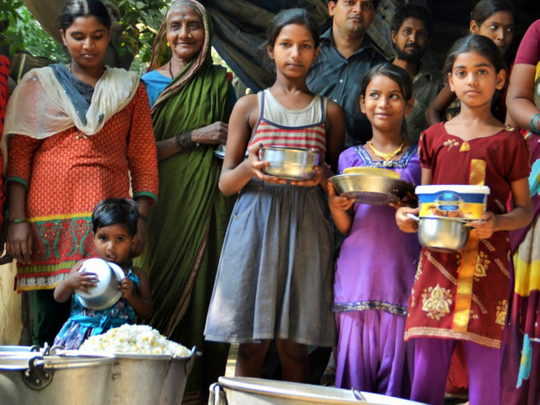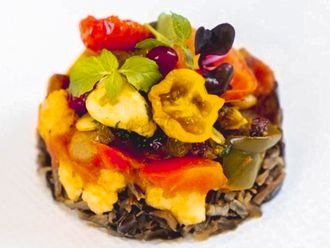
As the white Maruti van snakes its way through the late morning Delhi traffic and enters a large, dusty open track before coming to a halt outside the Jeevan Deep Khusht Ashram (Lepers Colony) in RK Puram, one of the oldest and larger developments in the Indian capital, children of all ages rush outside while men and women come forward eagerly, each clutching clean utensils and plates. Smiles erupt all around as the driver, 34-year-old Pradeep Sharma, and his assistant Bura Kumar begins the process of removing the large containers of food from the van.
For the inhabitants of the Khusht Ashram — one among the several clustered in and around the city — looking forward to the arrival of the food-laden van is a daily ritual. Ostracised by society because of the disease and forced to leave their native villages and loved ones, it is these dusty environs well concealed from the sprawling city’s urban milieu that is now home to around 75 migrant families from Karnataka, Uttarakhand, Bihar, Chhattisgarh, and other states.
“Very few here have leprosy, but the social stigma that families of those affected face, have forced us to live within the boundaries of this leper community since the past 30 years,” says 42-year-old Chandrabag while filling up her vessel with corn pulao, a generous helping of yoghurt-based kadhi, paneer makhani and creamy dal.
“We face many indignities in our daily lives and while many shun us, it is comforting to know that there are kind-hearted souls out there who spare a thought for our needs.”
As she waits patiently in line for her food, Jyoti, a 16-year-old, whose father died of the disease several years ago, says: “My mother makes around R3,000 (Dh175) a month; hence the food provided to us so generously twice a day is a boon as it helps her in channelling her meagre financial resources towards our education and other expenses.”
Were it not for the wholesome and nutritious food that they were assured of twice daily, she adds, “Many children like me who now go to school would have had to beg for alms to appease our hunger.”
For hundreds of children whose families can barely afford to put food on the table, the opportunity to dine on nourishing food twice every day has been made possible, thanks to the efforts of a US-based Indian engineer, Varinder Bhalla, who first conceived of the idea to honour the memory of his mother on her first death anniversary 24 years ago.
“My mother, Agyawanti Bhalla, always believed that the best way to serve god is by helping the poor and feeding the hungry,” says Bhalla, a mechanical engineer who now runs a consulting business in Information Technology in New York. “I grew up watching her feed hungry people every day in our hometown in Amritsar, Punjab.”
Hence, in 1990, on the occasion of her first death anniversary, he discussed with his wife Ratna a plan to feed several thousand people on their next visit to India. “I thought this would be a fitting tribute to mum who always kept the welfare of the poor and hungry uppermost both in her thoughts and actions.”
Almost as if by coincidence, no sooner did he have the discussion with his wife than Bhalla switched on the television and was pleasantly surprised to find a programme about a food bank in Washington DC that collected surplus food from five star hotels in the US capital and distributed it to the needy people.
An excited Bhalla told his wife, “If we could set up a food bank like this in India, we could feed hungry people every day and honour mother’s legacy.” Ratna was fully supportive of the idea and they travelled to Washington a few days later to learn how the food bank acquires food and its network of distribution.
A few weeks later, Bhalla reached India and discussed with prominent five star hotels in Delhi the idea of donating surplus food for distribution to the needy. To help him in this noble venture, Bhalla’s friend, Dr Brij Mohan Abrol, a physician, and Sunaina Singh, a retired principal of a primary school, volunteered their services.
Hyatt Regency was the first hotel to commit to the programme and soon thereafter, the Bhallas bought two vans and hired the necessary manpower to run the operations. Thus it was that on October 23, 1991, Varinder Bhalla and Dr Abrol walked into the kitchen of Hyatt Regency Hotel and collected the surplus food left in their refrigerators, driving onward to an institute of the blind to serve 50 of its residents. With this simple gesture, the Agya Wanti Bhalla Food Bank (AWB Food Bank), named after Bhalla’s mother, was born.
Soon other five star hotels in New Delhi including The Ashok, ITC Maurya and The Oberoi joined the hunger relief mission as did airline caterers who were happy with the idea of donating the excess food they produce daily instead of having to dump these the following day. With the participation of more hotels, the AWB Food Bank quickly progressed from feeding 50 people daily to 1,000 people, mostly children.
“This was a novel programme at the time in India as it fought not only starvation and the hunger of the deprived sections of society but also food wastage,” says Bhalla. “The AWB Food Bank collects excess food — not leftovers — from top hotels and after checking the food for quality by our volunteers, it is distributed to the needy. Hotel staff themselves hand over the food preserved in their cold storage to our team members.”
At the outset, Bhalla had decided that only vegetarian food would be collected, partly because “my mother was a strict vegetarian and also because nonvegetarian food perishes quickly”.
In a country that is home to the largest number of hungry people and where, according to recent Food and Agricultural Organisation estimates, more than 230 million people go hungry every day, this initiative that sought to fight hunger did not go unnoticed. Apart from media reports in newspapers and magazines, the nation’s international flagship carrier, Air India, also aired a video tape of the activities of the AWB Food Bank in its New York bound flights.
Former presidents of India, Giani Zail Singh and K.R. Narayanan, also took keen interest in the functioning of the AWB Food Bank and appealed to the privileged across India, and NRIs, to support its activities.
“All this unexpected publicity helped in the expansion of the food programme,” notes Bhalla. “It was thanks to the media coverage that R.C. Bhargava, the then chairman and managing director of Maruti Udyog, India’s largest car manufacturer, reached out to AWB in 1992 saying he would be proud to be associated with our noble venture.”
Maruti offered surplus food from its kitchens where three meals are cooked each day for several thousand workers. Even today, the association with Maruti continues and the food made in its kitchens reaches 250 inmates at the leprosy colony in RK Puram, the 40 families or around 150 migrants who have made their home in two empty railway carriages at Ren Basera, a government aided night shelter for the homeless, and the students of the All India Federation of The Deaf (AIFD).
Other institutions that have benefited from the services of the AWB Food Bank over the years include Ankur School, Chetna Ghar, Qutab Rotary Center for Handicapped Children and Vocational Training, amongst several others.
Since its inception in 1991, the AWB Food Bank has distributed more than 10 million meals across the city of Delhi. “None of this would have been possible without the absolute and total support of my wife,” says Bhalla. “Twice in the past 15 years when I wanted to shut down the Food Bank, it was Ratna who urged me to continue.”
Sanghamitra Bose, founder and executive director of Delhi-based civil society organisation, Sshrishti, which works with the city’s slum children, says, “Food was a major incentive for the students to come to school and it also adds to their nutrition as most of them do not get a balanced meal at home.” Around 350 underprivileged children enjoyed daily meals provided by AWB food Bank for more than six years.
According to Nainu Singh, the general secretary of Rural Education & Welfare Society (REWS), a school for the slum children in Vasant Kunj, “With the mid-day meal provided by AWB, we have seen marked improvement in the health of the children and their eagerness to learn.”
Dr Rajesh Kumar, executive director of the Society for Promotion of Youth and Masses (SPYM) shelter homes in South Delhi notes that “provision of meals by AWB Food Bank encourages children to participate in the shelter’s activities such as non-formal education and other recreational programmes, keeping them away from begging and rag picking.”
At present, the NGO operates with just one van and therefore can cater to the needs of only around 1,000 people daily. Every day at 9.30am driver Pradeep Sharma makes his way first to Hyatt and then to The Ashok followed by The Lalit from where hot, freshly made food is provided and finally to ITC Maurya where several kilos of assorted bread, muffins, croissants, bagels, etc are handed out. After the completion of the food distribution, a second trip for collection begins at 1.30pm to Maruti Udyog.
Says Pradeep, “I may be just a driver, but the grateful smiles and blessings I receive each day make me feel I am doing the most virtuous job in the world.”
As the AWB Food Bank now enters its 24th year of service, Bhalla has also expanded its assistance to the disadvantaged children in their quest for education. In 2014, AWB established a scholarship for the visually impaired at the Amritsar Blind School. And last September, moved by a news report, the Bhallas flew to Vadodara in Gujarat to provide a motor boat for nearly 100 children from tribal villages who until then had to swim across a turbulent river to reach their school.
Sangeetha Swaroop is a writer based in Dubai.

















